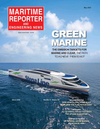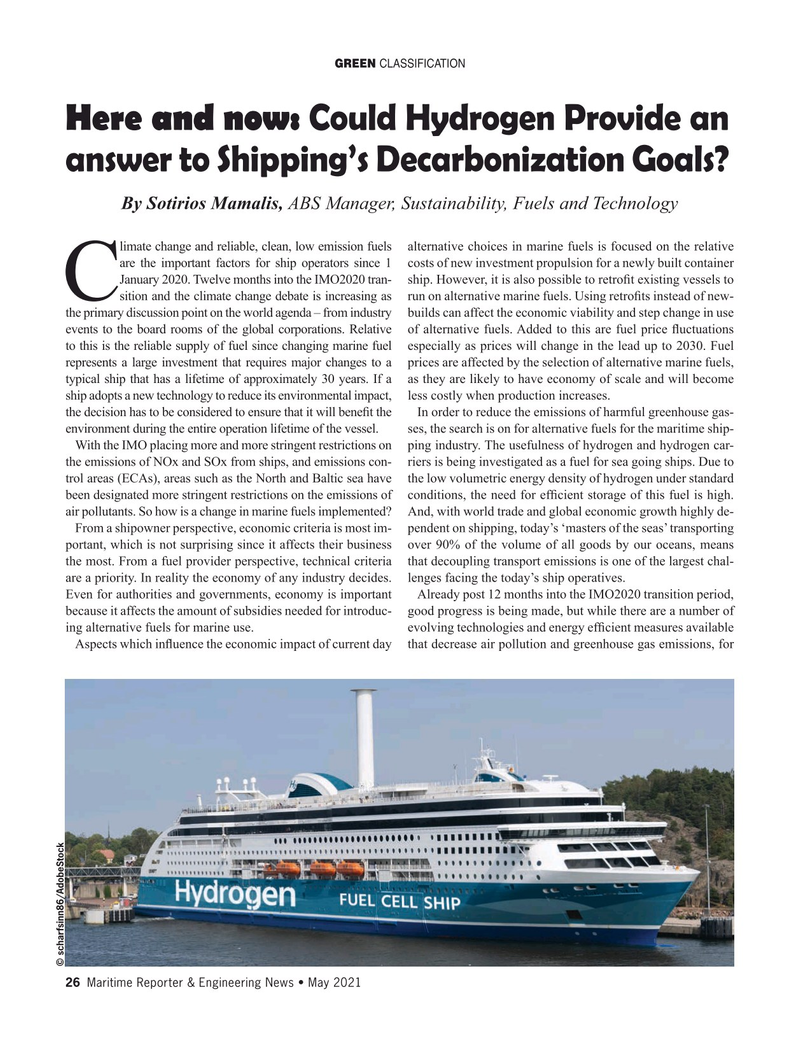
Page 26: of Maritime Reporter Magazine (May 2021)
Green Ship Technologies
Read this page in Pdf, Flash or Html5 edition of May 2021 Maritime Reporter Magazine
GREEN CLASSIFICATION
Here and now: Could Hydrogen Provide an answer to Shipping’s Decarbonization Goals?
By Sotirios Mamalis, ABS Manager, Sustainability, Fuels and Technology limate change and reliable, clean, low emission fuels alternative choices in marine fuels is focused on the relative are the important factors for ship operators since 1 costs of new investment propulsion for a newly built container
January 2020. Twelve months into the IMO2020 tran- ship. However, it is also possible to retro? t existing vessels to
Csition and the climate change debate is increasing as run on alternative marine fuels. Using retro? ts instead of new- the primary discussion point on the world agenda – from industry builds can affect the economic viability and step change in use events to the board rooms of the global corporations. Relative of alternative fuels. Added to this are fuel price ? uctuations to this is the reliable supply of fuel since changing marine fuel especially as prices will change in the lead up to 2030. Fuel represents a large investment that requires major changes to a prices are affected by the selection of alternative marine fuels, typical ship that has a lifetime of approximately 30 years. If a as they are likely to have economy of scale and will become ship adopts a new technology to reduce its environmental impact, less costly when production increases.
the decision has to be considered to ensure that it will bene? t the In order to reduce the emissions of harmful greenhouse gas- environment during the entire operation lifetime of the vessel. ses, the search is on for alternative fuels for the maritime ship-
With the IMO placing more and more stringent restrictions on ping industry. The usefulness of hydrogen and hydrogen car- the emissions of NOx and SOx from ships, and emissions con- riers is being investigated as a fuel for sea going ships. Due to trol areas (ECAs), areas such as the North and Baltic sea have the low volumetric energy density of hydrogen under standard been designated more stringent restrictions on the emissions of conditions, the need for ef? cient storage of this fuel is high. air pollutants. So how is a change in marine fuels implemented? And, with world trade and global economic growth highly de-
From a shipowner perspective, economic criteria is most im- pendent on shipping, today’s ‘masters of the seas’ transporting portant, which is not surprising since it affects their business over 90% of the volume of all goods by our oceans, means the most. From a fuel provider perspective, technical criteria that decoupling transport emissions is one of the largest chal- are a priority. In reality the economy of any industry decides. lenges facing the today’s ship operatives.
Even for authorities and governments, economy is important Already post 12 months into the IMO2020 transition period, because it affects the amount of subsidies needed for introduc- good progress is being made, but while there are a number of ing alternative fuels for marine use. evolving technologies and energy ef? cient measures available
Aspects which in? uence the economic impact of current day that decrease air pollution and greenhouse gas emissions, for © scharfsinn86/AdobeStock 26 Maritime Reporter & Engineering News • May 2021
MR #5 (18-33).indd 26 5/6/2021 5:26:29 PM

 25
25

 27
27
